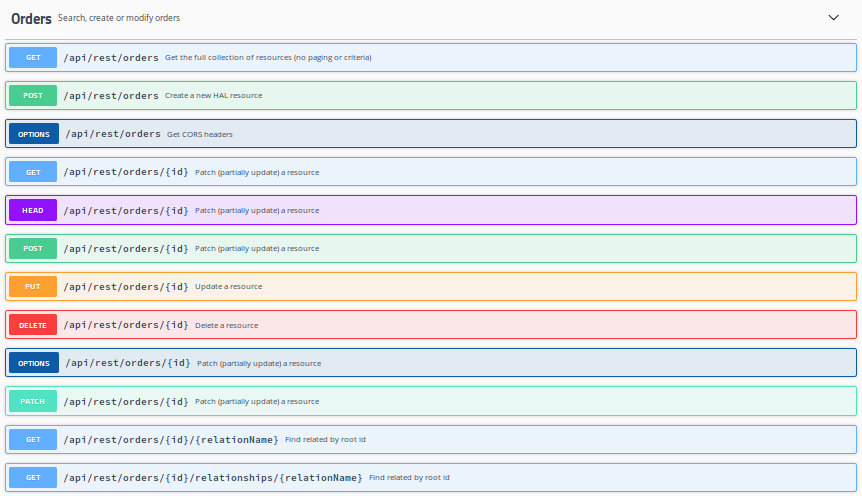RESTful Services
For each ScrudBean like the Order entity in the previous chapter, ScrudBeans will generate a number of
components and expose a RESTful services for SCRUD: Search, Create, Update and Delete.
Default Endpoints
| Method | Path | Description |
|---|---|---|
| GET | /api/rest/orders/{id} | Fetch the order matching the id |
| GET | /api/rest/orders/{id}/relationships/{relation} | Fetch the related object for the order matching the id |
| GET | /api/rest/orders?email=%25startsWith | Search based on model properties using simple name-value pairs as URL query string parameters (paged) |
| GET | /api/rest/orders?filter=createdDate=ge=2018-12-10T00:00;createdDate=le=2018-12-10T23:59:59 | Search based on model properties using an RSQL or FIQL filter (paged) |
| GET | /api/rest/orders?page=no | Get all orders |
| POST | /api/rest/orders | Create a new order |
| PUT | /api/rest/orders/{id} | Update the order matching the id |
| PATCH | /api/rest/orders/{id} | Partially update the order matching the id |
| DELETE | /api/rest/orders/{id} | Delete the order matching the id |
| <!--- GET | /api/rest/orders/jsonschema | Get the JSONSchema for orders --> |
If you are using the scrudbeans-template, you can inspect the endpoints by starting Spring Boot
with ./mvnw spring-boot:run and pointing your browser to http://localhost:8080/swagger-ui.html

Error Responses
> The `scrudbeans-error` module is a lightweight dependency that can be used for enabling RESTful errors in any Spring Boot project.
ScrudBeans will automatically handle any exception by creating an appropriate RESTful HTTP response.
It will also automatically perform validation based on Java Bean Validation (javax.validation) before persisting
or updating an entity and provide meaningful messages in such a response as necessary. For example, consider the
following entity field:
@NotNull
@Column(nullable = false, unique = true)
private String code;
A null value will result in the following response:
{
"message": "Validation failed",
"httpStatusCode": 400,
"requestMethod": "POST",
"requestUrl": "/api/rest/discountCodes",
"validationErrors": [
{
"message": "must not be null",
"propertyPath": "percentage"
}
],
"remoteAddress": "127.0.0.1",
"userAgent": "Apache-HttpClient/4.5.6 (Java/1.8.0_181)"
}
Similarly, a non-unique value will result in the following response:
{
"message": "Validation failed",
"httpStatusCode": 400,
"requestMethod": "POST",
"requestUrl": "/api/rest/discountCodes",
"validationErrors": [
{
"message": "Unique value not available for property: code",
"propertyPath": "code"
}
],
"remoteAddress": "127.0.0.1",
"userAgent": "Apache-HttpClient/4.5.6 (Java/1.8.0_181)"
}
